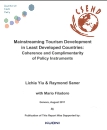CSEND Policy Studies are in-depth research papers that are at times equivalent to a fully developed scholarly book
“Learning to Grow: A Human Capital-focused Development Strategy, with Lessons from Singapore”
Raymond Saner and Lichia Yiu, 2014, The Graduate Institute, Geneva, 2014, Articles and Debates 5.3
Low levels of human capital stock limit growth opportunities for companies and correspondingly can slow down economic development thereby endangering a country’s competitiveness. Perceived underinvestment in human capital by its firms can be corrected by a country by making investment in human capital a centrepiece of its development strategies. Singapore provides a model of such a strategy, continuously improving its human capital to attract foreign investment to the county. Singapore’s continuous upgrading of its workforce’s skills has unlocked equally continuous development of higher value added economic activity, a development “miracle.”
Greening WTO Agreements to stop Climate Warming
Raymond Saner, 5th July 2013
Radical new approaches are urgently needed to reverse climate warming and to prevent the world from committing “ecocide” through environmental destruction. The radical new solutions proposed in this policy study go beyond the incremental change of current policy practice and instead suggest the need for a discontinuous change as the only means of halting the pervasive “tinkering along” approach of mainstream policy making which have not been able to bring about a halt to climate warming. This policy paper assesses the various attempts of state and non-state actors to cope with climate change and argues that a radically new approach is needed within the WTO agreements to generate solutions that have sufficient weight and treaty power to bring about a new and credible approach towards halting and reversing of climate warming.
Building on previous analysis and recommendations, this policy study discusses the interface between multilateral agreements on trade and on climate change and suggests that the WTO is the only multilateral institution which can effectively generate legal constraints and political will to stop climate warming. This policy study proposes an intra-regime solution within the WTO agreement in order to elicit the green investments and green production needed to successfully implement climate change mitigation and adaptation.
The following questions are addressed by this policy study: Which are the international economic governance options to effectively stop climate warming? Which are the main disciplines within the WTO Agreements addressing environment, trade, investment and intellectual property? What can be changed within the WTO Agreements to foster a green economy in developed and developing countries? What does the WTO case law say about disputes involving environment, trade, and investment?
Mainstreaming Tourism Development: Policy Coherence and Complementarity (2011)
 Tourism is a significant contributor to GDP, employment and to the international appreciation of a country and its culture – regardless of its level of development. This policy analysis seeks to assist the Least Developed Countries (LDCs) in harnessing development opportunities by providing a comprehensive overview of existing international development instruments, i.e., Diagnostic Trade Integration Studies (DTISs) and their Action Matrices, Poverty Reduction Strategy Papers (PRSPs), and reviewing their alignment with the national tourism development strategies, investment policies and tourism related trade arrangements.
Tourism is a significant contributor to GDP, employment and to the international appreciation of a country and its culture – regardless of its level of development. This policy analysis seeks to assist the Least Developed Countries (LDCs) in harnessing development opportunities by providing a comprehensive overview of existing international development instruments, i.e., Diagnostic Trade Integration Studies (DTISs) and their Action Matrices, Poverty Reduction Strategy Papers (PRSPs), and reviewing their alignment with the national tourism development strategies, investment policies and tourism related trade arrangements.
The authors encourage the use of findings from this analysis by all actors and stakeholders engaged with trade facilitation activities in LDCs. In reviewing these key development policy documents, this in-depth analysis seeks to better equip LDCs to manage international policy advice provided by a multitude of international development partners. The ultimate objective of this work is to support their achievement of greater social and economic benefits through growth trade in tourism services. It is also hoped that this analytical report will enhance the coherence and complimentarity of tourism development advice proposed by the international community via drawing attention to policy gaps and implementation vacuums existing within the tourism supply and value chain.
Author: Lichia Yiu & Raymond Saner with Mario FiladoroISBN: 978-2-8399-0927-7
![]() Annex 1: Tourism References in DTIS, Action Matrix, PRSP and IPR
Annex 1: Tourism References in DTIS, Action Matrix, PRSP and IPR
![]() Annex 2: GATS Sector Specific and Horizontal Commitments
Annex 2: GATS Sector Specific and Horizontal Commitments
![]() Annex 3: UNCPC classified GATS Sector Commitments
Annex 3: UNCPC classified GATS Sector Commitments
![]() Annex 4: Country Risk Briefing
Annex 4: Country Risk Briefing
![]() FEEM Free Press published this policy study as an e-book in 2016
FEEM Free Press published this policy study as an e-book in 2016